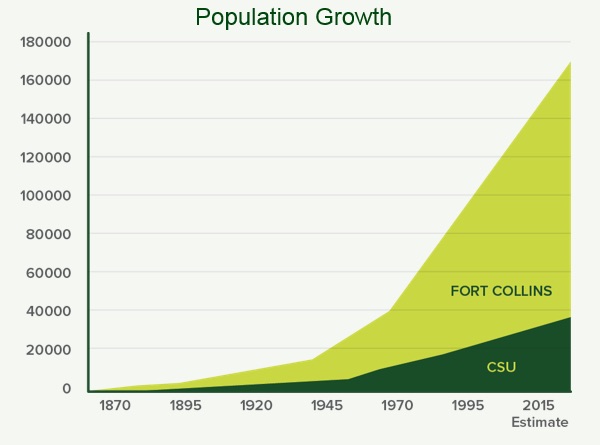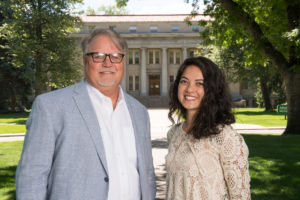With more than 160,000 residents at last estimate, there is no question that Fort Collins has grown into a small city. Repeatedly recommended by national publications as a desirable place to live, start a business, or retire, the Choice City is feeling the pressure of its own success. By 2030, Fort Collins could add nearly 50,000 new residents.
Compared to the increase in the Colorado State University student population, the city’s growth has skyrocketed. Since 1970, the University has grown from 17,000 resident students to more than 32,000 in 2015, with another increase anticipated for the coming academic year. Over the same period, Fort Collins grew from 43,000 to 161,000 residents — over twice the growth rate of CSU.
Competition for available places to live has increased as well, driving up prices for both renters and buyers.
As the largest employer in the Northern Colorado region, Colorado State University has a vested interest in collaborating with the City of Fort Collins and other partners to address the complex challenge of providing adequate affordable housing. In Fall 2015, CSU President Tony Frank – in conjunction with the Re-Envision Colorado State initiative – charged a Housing Solutions Task Force to take a hard look at the affordability and availability of housing in our community and its impact on our ability to recruit and retain faculty and staff.

Housing is an issue shared by the entire community, according to Frank.
“I’d characterize these efforts as trying to better understand the impact of the NoCo housing market on CSU students and employees (and our impact on the market) — everyone from students living off-campus within the community to our lowest income employees and entry-level faculty members,” Frank said.
Frank asked the task force to come forward with recommendations on how CSU — both on its own and in collaboration with other community partners — can continue to ensure that CSU employees can live, grow and participate actively as citizens in the community in which they work. The task force will also seek to identify opportunities to better connect employees with existing services, explore the possibilities of using University-owned land and properties, and identify national best practices to address housing issues.
Housing challenges have a range of impacts on employees, said Cori Wong, special assistant to the president and director of the Women & Gender Collaborative. Wong served as founding chair of the task force when it began its work last year.
“We know that housing affordability is a complex challenge that affects our employees in very different ways – whether that is in affording rent, saving to purchase a home, or having to commute to work from more affordable places,” Wong said. “There is not a single solution that will serve everyone, so CSU has been exploring several options that could help mitigate some challenges for staff and faculty in our current housing market.”
Changing of the guard

The work of the task force continues in 2016-17 under the guidance of Tom Milligan, vice president for External Relations, who has been appointed as the new chair by Frank.
“While this is clearly an issue for many of our faculty and staff at the University, it is also a community-wide issue,” Milligan said. “As we begin to look to things we might do to assist with our own university community, we’ll be working very hard to make sure that all we do is in direct coordination and collaboration with the many people and organizations in Fort Collins that are already hard at work on this issue. None of us can hope to solve it alone, but working together, we’re hopeful that we can make a difference.”